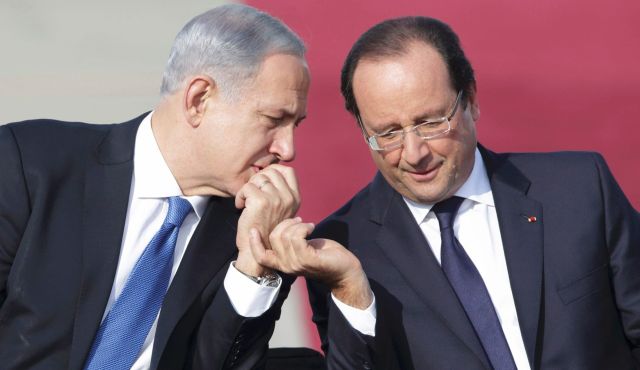PHOTO: Israeli Prime Minister Benjamin Netanyahu and French President Francois Hollande on Sunday (Reuters)
ALSO IN MONDAY FORECAST
Rouhani: Nuclear Deal Possible If No “Excessive Demands”
Supreme Leader Lashes Out at “Untrustworthy, Supercilious” US
Head of Revolution Guards Dismisses US “Military Option” as “Lie”
After a weekend of optimistic statements about an interim deal over Iran’s nuclear programme — perhaps this week in meetings between the Iranians and the 5+1 Powers in Geneva — both the US and France put out tougher lines on Sunday about the negotiations.
Far from coincidentally, the positions of both countries were linked to Israel, with French President Francois Hollande beginning three days of talks in West Jerusalem and US Secretary of State John Kerry arriving on Friday, as the talks are proceeding in Geneva.
Hollande, whose delegation blocked an interim deal last weekend, repeated the condition that construction of the Arak heavy-water nuclear reactor must be halted. He also insisted, “Put all the Iranian nuclear installations under international supervision, right now….Suspend enrichment to 20 percent [of uranium]….Reduce the existing stock.”
Iran appears willing to meet the latter three demands, but is unlikely to agree to a long-term suspension of Arak’s construction.
See Iran Analysis: How France — & the US — Changed Nuclear Talks at Last Minute in Geneva
Hollande’s stand boosted Israeli Prime Minister Benjamin Netanyahu, who declared at their press conference, “It’s clear that this agreement is good only for Iran and that it’s really bad for the rest of the world. Iran’s dream deal is the world’s nightmare.”
See Israel Spotlight: Netanyahu Uses Social Media For Campaign Against Iran Nuke Deal
Meanwhile, “informed US sources” paralleled Hollande’s statement, telling the Israeli daily Haaretz that the 5+1 Powers would insist on a freeze of construction inside Arak and of the current levels of all enriched uranium — not just 20% stock, but the lower-level 3.5% — inside the country.
Rouhani: Nuclear Deal Possible If No “Excessive Demands”
President Rouhani has said an interim nuclear deal is possible in teh Geneva talks this week if the 5+1 Powers do not make “excessive demands”.
According to State media, Rouhani told Russian President Vladimir Putin:
At the recent Geneva talks good progress was made, but everyone must realize excessive demands could complicate the process towards a win-win agreement.
From our point of view, there should not be a situation in which the will of parties to reach mutually acceptable agreement is affected.
Supreme Leader Lashes Out at “Untrustworthy, Supercilious” US
Ayatollah Khamenei’s office has some choice adjectives for the Obama Administration on Twitter this morning:
#Untrustworthy #Supercilious #Promise_breaker #USgovt pic.twitter.com/CnyVbjNNnT
— khamenei.ir (@khamenei_ir) November 18, 2013
Officials Play Down Challenge of Sunni Insurgent Group
The deputy head of judiciary, Ebrahim Raeesi, has talked down the challenge from the Sunni insurgent group Jaish ul-Adl.
Raeesi said the group, active in Sistan Baluchestan, was bluffing when it claimed the assassination of the Chief Prosecutor in Zabol on November 6.
Jaish ul-Adl has carried out a series of attacks since its formation last year, including the killing of 14 border guards on October 25.
Raeesi said:
Jaish ul-Adl group has claimed responsibility for the assassination of Zabol prosecutor, but it is lying and we did not want to announce this issue on TV; when the group saw that the assassination had taken place, it wanted to attribute it to itself….
This group has made mistakes in its statement; first they said that they killed one person while two people had been killed and they also gave a wrong place and wrong time for the assassination.
Head of Revolution Guards Dismisses US “Military Option” as “Lie”
Iran’s military leaders slapped at US strength on Sunday, with the head of the Revolutionary Guards, Mohammad Ali Jafari, telling reporters:
The Americans’ statement about having the military option on the table is a lie.
Americans don’t know that we know they are afraid of attacking Iran more than any other country; there is absolutely no such thought in the minds of the US statesmen, but they talk about it [military power] as a political tool anyway.
Jafari claimed Washington deployed troops in all of its bases in Iran’s neighbors between 2003 to 2007: “They intended to launch a direct military attack on the country, but when they saw the Iranian nation’s subordination to its Leader, they felt scared and escaped.”
The commander also dismissed any effect of US-led sanctions: “They suppose that they can force the Iranian nation to surrender by doing so, but the outcome of all these sanctions has been the massive presence of the people in the rallies and at the ballot boxes as well as support for the Islamic establishment and its noble objectives.”
The head of the Basij militia, Mohammad Reza Naqdi, echoed Jafari, commenting on President Obama’s re-assertion that the military option is on the table: “These are just boastful remarks and bluffing because the US army and its economy are weak and their people do not accept to go to war.”
He added, “Neither the (military) options on the table nor their execution can intimidate us, let alone boasting about them.”

